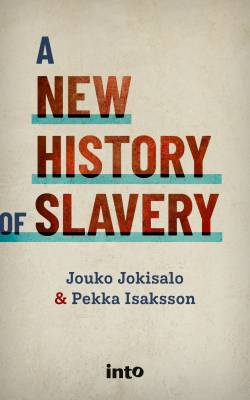A New History of Slavery
Jokisalo, Jouko; Isaksson, PekkaTuotetiedot
| Nimeke: | A New History of Slavery | ||
| Tekijät: | Jokisalo, Jouko (Kirjoittaja) Isaksson, Pekka (Kirjoittaja) Waller, Mark (Kääntäjä) |
||
| Tuotetunnus: | 9789523937505 | ||
| Tuotemuoto: | Pehmeäkantinen kirja | ||
| Saatavuus: | Tulossa 12.1.2026 | ||
| Ilmestymispäivä: | 12.1.2026 | ||
| Hinta: | 26,00 € (22,81 € alv 0 %) | ||
|
|||
| Kustantaja: | Into Kustannus |
| Painos: | 2026 |
| Julkaisuvuosi: | 2026 |
| Kieli: | englanti |
| Sivumäärä: | 300 |
| Tuoteryhmät: | Kaikki tuotteet Historia |
| Kirjastoluokka: | 30.11 Sosiaaliset järjestelmät |
The long and barbaric history of slavery has left a mark on the world that can be seen and felt today. It is a wound that can heal, but those scars will likely ever fade.
A New History of Slavery explores the history of slavery from ancient times to the present day. The slave societies of ancient Greece and Rome have had a significant impact on Western history, from Athens to Auschwitz; and the tentacles of Islamic slavery reached as far as the Nordic countries. Famously, the slave trade from Africa to America is one of the worst human rights violations in the history of mankind, but during the Age of Enlightenment, slave ownership was paradoxically presented as a human right.
The abolition of Atlantic slavery has often been credited either to Christian humanitarian movements or to industrial capitalism. The resistance of the enslaved themselves has been overlooked. In this book, the enslaved are given their rightful place in history. Resistance significantly slowed down the slave trade, saving approximately one million Africans from enslavement. More than 300 slave rebellions broke out on the North American continent, and more in the Caribbean.
Historical writing has become more diverse in recent decades, but inaccurate information about slavery persists. It is fueled by ultra-conservative movements and politicians to this day.
”What is particularly good about A New History of Slavery is that the authors write about the enslaved as historical actors who did not resign themselves to their fate. The abolition of slavery was not only the result of opposition from white abolitionists, but also of resistance from the enslaved themselves.”
– Kulttuuritoimitus
Jouko Jokisalo is a Finnish historian who has worked as a lecturer of history and social studies at the University of Eastern Finland and as a docent in European history at the University of Oulu.
Pekka Isaksson is a Finnish journalist and historian specializing in racism and race theories. Isaksson received his doctorate from the Department of History at the University of Oulu in 2001. He has written books on the history of racist ideas, as well as several popular and scientific articles about racial theories related to the Sámi people.
A New History of Slavery explores the history of slavery from ancient times to the present day. The slave societies of ancient Greece and Rome have had a significant impact on Western history, from Athens to Auschwitz; and the tentacles of Islamic slavery reached as far as the Nordic countries. Famously, the slave trade from Africa to America is one of the worst human rights violations in the history of mankind, but during the Age of Enlightenment, slave ownership was paradoxically presented as a human right.
The abolition of Atlantic slavery has often been credited either to Christian humanitarian movements or to industrial capitalism. The resistance of the enslaved themselves has been overlooked. In this book, the enslaved are given their rightful place in history. Resistance significantly slowed down the slave trade, saving approximately one million Africans from enslavement. More than 300 slave rebellions broke out on the North American continent, and more in the Caribbean.
Historical writing has become more diverse in recent decades, but inaccurate information about slavery persists. It is fueled by ultra-conservative movements and politicians to this day.
”What is particularly good about A New History of Slavery is that the authors write about the enslaved as historical actors who did not resign themselves to their fate. The abolition of slavery was not only the result of opposition from white abolitionists, but also of resistance from the enslaved themselves.”
– Kulttuuritoimitus
Jouko Jokisalo is a Finnish historian who has worked as a lecturer of history and social studies at the University of Eastern Finland and as a docent in European history at the University of Oulu.
Pekka Isaksson is a Finnish journalist and historian specializing in racism and race theories. Isaksson received his doctorate from the Department of History at the University of Oulu in 2001. He has written books on the history of racist ideas, as well as several popular and scientific articles about racial theories related to the Sámi people.


